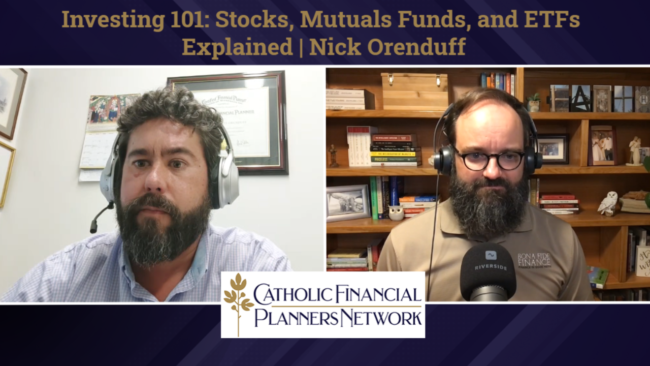In this episode of the podcast hosted by Ben Martinek from the Catholic Financial Planners Network, guest Nick Orenduff of Orenduff Associates shares his insights on various investment vehicles and the importance of diversification. They discuss the differences between stocks, mutual funds, ETFs, and bonds, highlighting the roles these instruments play in a diversified investment portfolio. The conversation also covers the distinctions between fixed income investments and stock ownership, explaining the purposes and benefits of each. Additionally, they emphasize the significance of long-term investing and prudent financial planning for achieving financial freedom, particularly as one approaches retirement. If you’re looking for a quick introduction to investing, this is the episode for you!
Key Takeaways:
• What’s the difference between stocks, mutual funds, ETFs, and bonds? And how do I know which investment vehicle is right for me?
• How diversification and long term thinking will lead to success.
• How Isaac Newton got swept up in the stock market.
• Why are bonds less popular than stocks? And what are their benefits?
Key Timestamps:
(00:00:00) – Introduction
(00:01:34) – Nick’s Journey in Financial Planning
(00:02:42) – Understanding Investing
(00:07:16) – What is a Stock and Why Do Companies Sell It?
(00:16:59) – Mutual Funds and ETFs Explained
(00:24:19) – Exploring Fixed Income Investments
(00:29:00) – How Can Bonds Serve Investors?
(00:31:26) – The Importance of Diversification
(00:34:08) – Letting the Markets Work for You
Key Topics Discussed:
Catholic Money Mastermind, Catholic financial planning, Catholic financial planners, Catholic financial advisors, Ben Martinek, faith and finances, Nick Orenduff, Orenduff and Associates, stock market, ETFs, bonds, investments
Mentions:
Nick’s Website: https://www.planmember.com/orenduff/
Catholic Money Mastermind Podcast is a personal podcast meant for educational and entertainment. It should not be taken as financial advice, and is not prescriptive of your financial situation.

